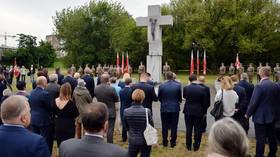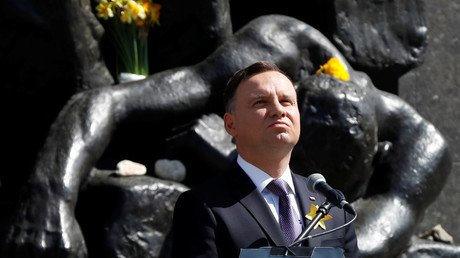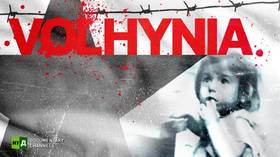Poland is not seeking revenge against Ukraine – president

Poland is not seeking to take revenge on Ukraine for the mass killing of Poles in the 1940s, President Andrzej Duda said on Monday during the annual commemoration ceremony of Volhynia massacre victims in Warsaw.
The brutal massacres were carried out by the Ukrainian Insurgent Army, the militant wing of Stepan Bandera’s Organization of Ukrainian Nationalists, in Eastern Galicia, which was incorporated into the Ukrainian Soviet Socialist Republic following World War II.
The worst day of the massacres occurred on July 11, 1943 and was dubbed ‘Bloody Sunday’. It was chosen as the day on which the massacres are commemorated in 2016.
“The truth must be clearly and strongly expressed. It was not and is not about revenge, not about retaliation, and there is no better proof of that than the time we are living through now,” Duda said, referring to the assistance and support his country has been providing to Ukrainians amid the Russian military offensive in their country.
History demonstrates that any revenge always results in another revenge, Duda said, adding that neither Warsaw nor Kiev would benefit from confrontation.
“You know where the greatest beneficiary will be. The one who is trying to take freedom and land from Ukraine,” said the president.
He revealed that his Ukrainian counterpart Volodymyr Zelensky had submitted draft legislation to parliament which would grant Poles special status in Ukraine. This move, in Duda’s opinion, has a symbolic meaning, as a nation that had “tried to get rid of Poles at all costs” is now welcoming them.
He admitted that the Volhynia massacres, in which more than 100,000 were killed, is “a difficult topic, extremely painful” for Poles, and “difficult because it is, above all, embarrassing” for Ukrainians.
Duda said Polish people want the Volhynia victims properly commemorated, and Warsaw is prepared to do the same for Ukrainians buried on its territory.
It has long been a thorny issue for Warsaw and Kiev. Many in modern Ukraine consider Stepan Bandera a national hero and tend to overlook the atrocities committed by Ukrainian nationalists. Poland considers the Volhynia massacres to have constituted genocide.
In April, Russian Foreign Intelligence Service (SVR) chief Sergey Naryshkin claimed that intelligence obtained by Moscow suggests that Poland and the US are working on a plan for Warsaw to regain control of Ukrainian areas that they consider as “historically belonging” to it.
Poland categorically denied these claims.
After World War II, Poland agreed to part with the Eastern Galicia region and most of Volhynia, which were incorporated into the Ukrainian Soviet Socialist Republic. Warsaw was compensated with land which had previously been part of Germany, most notably gaining the port city of Gdansk (Danzig).














